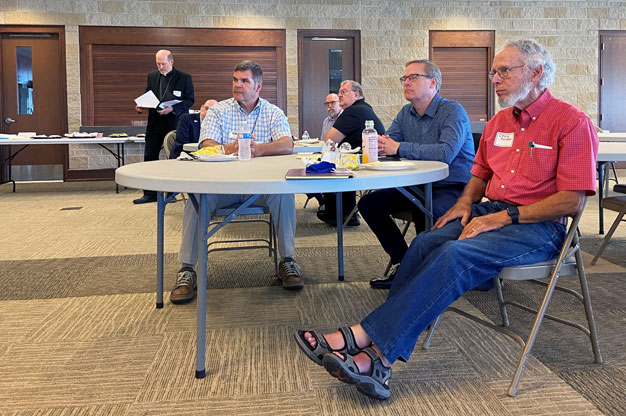
Kaveh Mostafavi of Iowa founded a wholesale distribution firm focused on sustainable products and systems called EcoCare. He was one of several Iowa business leaders who spoke at a dialogue on climate Aug. 24 at St. Patrick Catholic Church in Iowa City. Bishop Thomas Zinkula of the Diocese of Davenport convened the dialogue.
By Barb Arland-Fye
The Catholic Messenger
IOWA CITY — Inspired by Pope Francis’ call to create a sustainable future for all, Bishop Thomas Zinkula convened a dialogue on climate that drew Iowa business leaders who invest in clean energy because it makes sense for business and the planet.
Catholics Bob Rafferty and Rob Szalay, leaders of Iowa Business for Clean Energy, and Lonnie Ellis, OFS, executive director of In Solidarity, organized the dialogue held Aug. 24 at St. Patrick Catholic Church in Iowa City. Panelists were the senior vice president of the world’s largest truckstop, a Franciscan sister, and a wholesale distributor of sustainable products and systems.
Iowa Business for Clean Energy has two missions. “One is to help raise businesses’ awareness that working toward a low carbon footprint is becoming more and more important for the competitiveness of businesses small and large,” Rafferty told the gathering (including a virtual audience). The second mission is to educate businesses about the energy grid, how it is managed and governed, and to spark dialogue on needed change to ensure “we have the most efficient, cleanest energy grid at a price that allows businesses to continue to be competitive.”
Businesses desire to balance “the moral obligation to do good things to preserve our earth” with a return on investment, Rafferty said. “There is a business case for sustainability, for lowering the carbon footprint…. It is becoming critical for businesses to lower their carbon footprint to ensure they attract customers, attract employees; and more and more investors are demanding it.”
Bishop Zinkula pointed out that St. Patrick Parish, which had to relocate after a tornado destroyed its original church building, constructed a new church as a LEED-certified (Leadership in Energy and Environmental Design) building.
“In that vein, St. Patrick Parish has a creation care ministry that has implemented eco-friendly projects, such as recycling, the creation of a community garden and the study of resources on the topic of the environment,” the bishop said. He reflected on witnessing environmental stewardship growing up on a farm near Mount Vernon, Iowa, where his dad and uncle farmed together.
“They viewed themselves as caretakers or stewards of the land more so than owners of it. In recognition of their efforts, they received an Iowa soil conservation award one year. They were ahead of their time in regards to things like contour planting, constructing waterways and dams to save the soil, and minimum till — and eventually no till — planting. They instinctively and intuitively operated as participants in a larger plan.”
Care and share
“The Bible says that we are mere tenants. So what is the rent? What is the cost we pay as tenants?” the bishop asked. “God wants us to enjoy and live comfortably on his abundant earth, but he also has an expectation that we pay it forward to the next generation. God wants us to care for and share the bountiful resources that are entrusted to us with our children and grandchildren.”
Bishop Zinkula made a pitch for a new, seven-year initiative of Pope Francis, the Laudato Si Action Platform, based on his encyclical of the same name. The initiative aims to “help Catholics and our institutions, such as parishes, religious orders, schools and hospitals, care for our creation through our facilities, our curricula, our investments and more.”
The solution to the ecological crisis requires global coordination and market-based activity, the bishop said. “Business leaders are both wise and virtuous when they ensure that their companies have resilient and sustainable strategies for the long term — sustainable for the companies, for the economic system, and for the planet.”
Panelist Sister Jan Cebula, president of the Sisters of St. Francis of Clinton, shaped her remarks using the framework of the “see, judge, act” analysis to explore the concept of sustainability and care for creation. “We need to see the beauty of creation. Just go out and be in it. Open ourselves to the mystery and realize of course, it is a manifestation of God. God’s outpouring of love in creation.”
Humans are a part of creation, not apart from it. “Our call is to take our true place in it,” she said. “That’s going to require a lot of humility on the part of humans. We’re so used to using and exploiting and how we think about it.” She encouraged awareness of the impact of the ecological crisis on the marginalized people of the world and of the newest report of the Intergovernmental Panel on Climate Change (IPCC). The report makes clear the role of human activity and the need for transformational change.
Individuals and businesses need to ask themselves, Are we harming, or healing? I think we all know we have this moral obligation toward our sister and brother,” Sister Cebula said. “To prevent suffering, to relieve it, to reduce it.”
Balance competing interests
She described her community’s efforts to reduce its carbon footprint by embracing energy sustainability in the community’s motherhouse and office building. The sisters have restored some of their property to prairie. They have also invested in Climate Solutions Funds.
She pointed out the importance of collaborative efforts to address climate change and care of creation. Businesses will have to balance many competing interests, she concluded.
Panelist Delia Moon Meier, senior vice president of Iowa 80 Group, which operates the “world’s largest truckstop,” described how the business invested in solar energy, efficient lighting and installation of fast-chargers for electric vehicles in response to the evolving needs of customers.
She recalled a family gathering over the holidays when she overheard the conversation of the relatives in their 20s, which focused on the mileage their cars got. “They are my customers and they are my future customers,” she thought to herself as she reflected on their conversation on energy conservation.
The business adjusted its focus, investing in new lighting and other sustainability measures to reduce energy consumption. Neon lights — which people jokingly said could be seen from outer space — were converted to LEDs. Installation of solar energy panels and fast EV chargers required Meier’s personal energy and considerable time working with Rafferty, the company’s lobbyist in Des Moines, to ensure fair treatment for the investments.
Watching customers throw away unused paper napkins at two restaurants he operated with his brother motivated panelist Kaveh Mostafavi to found a wholesale distribution firm focused on sustainable products and systems. Later, he sold his interest in the business, stopped practicing law and founded EcoCare.
The firm supplies clients in government, business and industry with durable, compostable food ware and other eco-friendly products and supplies. EcoCare conducts consumption audits and provides clients with compostable products. He pointed out his company would have replaced the Styrofoam plates the gathering used for lunch that day with fiber-based plates.
He encouraged a change of behavior to help reduce food waste. “When people ask me, ‘How can I most effectively and directly have a lesser impact?’ I tell people, waste less food. I think that goes for all religions.” His big-picture idea is figuring out a way to convert raw, industrial hemp for use in creating fiber-based, compostable products in Iowa. Until the science to achieve that goal catches up, EcoCare has to rely on overseas manufacturers for its products.
During the Q&A after the panelists spoke, one of the attendees asked Meier why she would invest so much in EV chargers when Iowa 80 Truckstop is also in the business of selling petroleum. “I am in the customer service business,” Meier said. “I don’t care if your car runs on peanut butter, I want you as my customer.”











